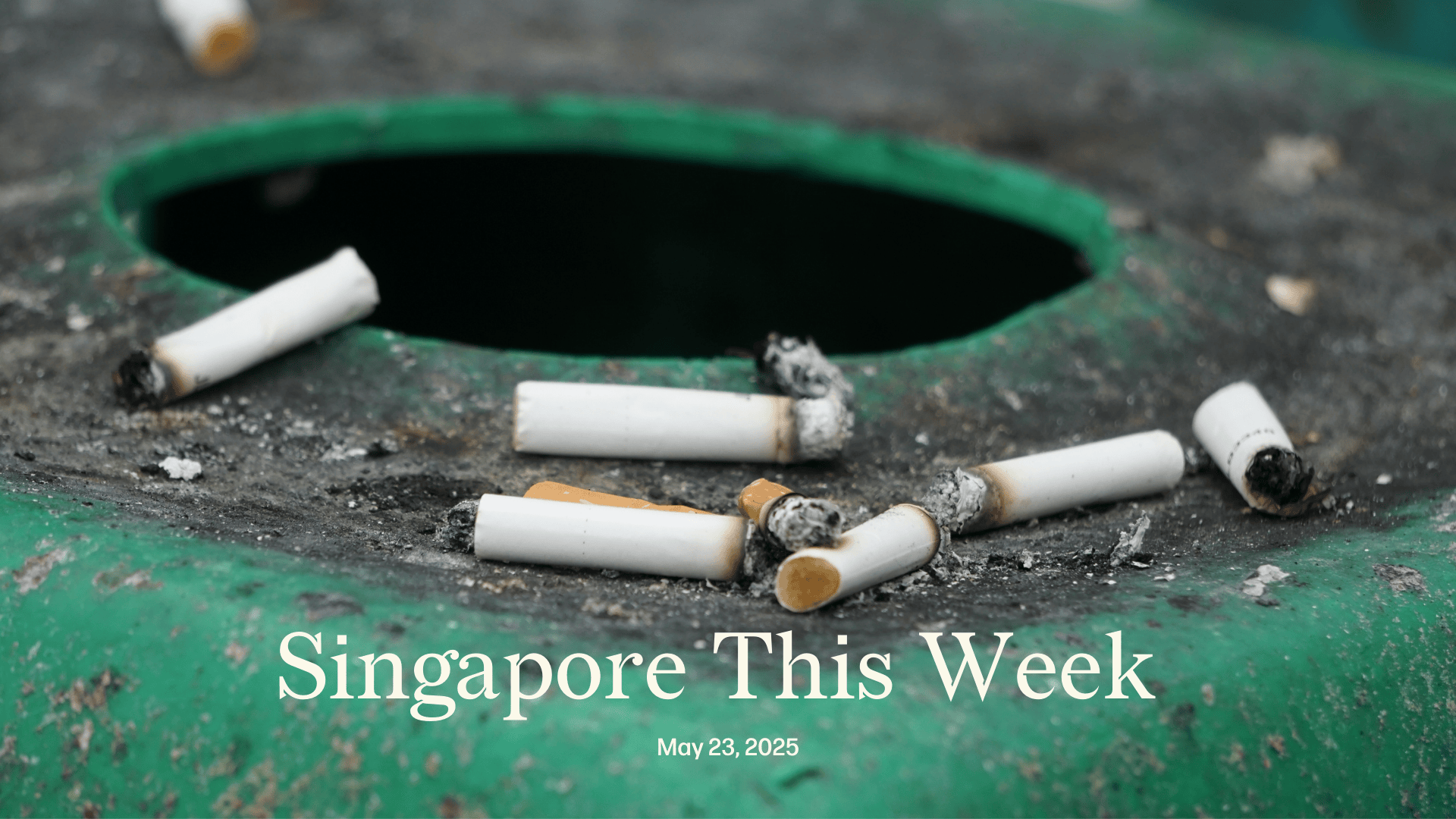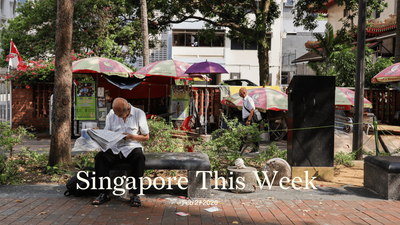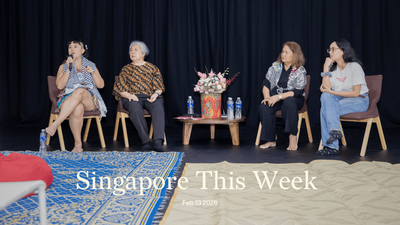Politics: Larry and the five wise men
Fresh off the stonking victory by the ruling People’s Action Party (PAP) at the 2025 general election (GE), Lawrence Wong, prime minister, has, as expected, reshuffled his cabinet. But how significant are the changes? And what do they tell us about the manner in which Wong will govern?
Our assessment is that Wong has shown himself to be a meticulous tinkerer, rather than a reformer, who’s rewarded electoral performance, while distributing power so as to foster teamwork between strong-headed individuals and ministries. He’s also cannily left himself latitude to test out new cabinet members before confirming them.
Perhaps most intriguingly, we also see the emergence of Wong the electoral strategist. His picks suggest that he’s already plotting an eastern defence, to try and neuter the inevitable ambition of the Workers’ Party (WP) at the next GE. Finally, the main disappointment is the paucity of women and ethnic minorities at the top.
Read on at “Larry and the five wise men: Singapore’s new cabinet”, Jom’s commentary this week.
Politics: The best losers
In 1981, JB Jeyaretnam of the WP won a by-election in Anson, breaking the 14-year parliamentary stranglehold of the PAP. This instigated a slew of political manoeuvres from Lee Kuan Yew, including the crackdown against alleged Marxists in 1987 (see below) and the introduction of the GRC system in 1988. But before all that, he introduced the non-constituency member of Parliament (NCMP) scheme ahead of GE1984, guaranteeing at least three opposition MPs in Parliament (the best losers). It was criticised across the political spectrum, both for its undemocratic nature and for presumably dampening the pressure to vote opposition. At GE1984, Jeyaretnam held onto his seat and Chiam See Tong of the Singapore Democratic Party (SDP) won another in Potong Pasir. That left one NCMP seat. Two opposition politicians declined, leaving it unfilled.
Fast forward four frenetic decades. As the opposition has slowly gained ground, the NCMP allotment has risen to 12. It’s no longer roundly poo-poohed but, given the greater exposure through parliamentary livestreams, seen as a vital testbed for new candidates. Leong Mun Wai and Hazel Poa of the Progress Singapore Party acquitted themselves admirably in the last few years, and the SDP’s Chee Soon Juan would have grabbed it had he been given the chance. Instead, he was narrowly pipped to it at GE2025 by the WP’s slate in Jalan Kayu SMC and Tampines GRC.
This week we found out that the WP’s Andre Low and Eileen Chong, from those respective districts, will take up the seats. Why them? Why not, say, Michael Thng? The party’s been mum about its selection process, though presumably Low had first dibs as the best loser, and the Tampines team had a frank conversation about who’d be best placed to contribute most. Remember, this is a poorly remunerated position (S$2,063 vs S$13,750 per month for a regular MP), and involves a sacrifice of some 30 days a year just for parliamentary sittings. Soon-to-be-father Low’s family, amongst others, deserves our gratitude. Whatever the rationale, it’s great that the Tampines GRC team chose its only woman—and a former foreign service officer and current philanthropic worker to boot. Just a month after “Mama Bear” Sylvia Lim spoke about the progress she’s seen in political gender equity over the past two decades, this was another step in the right direction.
Some further reading: In “Seeing is believing: why Singapore will benefit from having more female politicians”, we examine the evolution of female political representation and argue that there’s a long way to go.
Politics: The democrats will fight for democracy
Chee, Paul Tambyah, and the other swashbuckling warriors from the SDP aren’t going anywhere. That was the defiant message this week, as Chee announced a petition for electoral reform; launched a co-operative to create a “people-centric economic counterweight to the PAP-NTUC nexus”; and announced a drive to “tap into” the energy of younger Singaporeans.
The petition calls for democratic reforms that many Singaporeans desire: ensuring the independence of the Elections Department; improving the transparency of the Electoral Boundaries Review Committee’s decision making; abolishing the GRC system; ensuring a minimum three-week GE campaign period: a minimum six-month gap between boundary changes and the dissolution of Parliament; and media liberalisation through a review of the notorious Newspaper and Printing Presses Act, which benefits state-supported behemoths.
The Orange and Teal Social Enterprise Co-operative (OTSEC), meanwhile, wants to empower workers, freelancers, creatives, and small businesses in Singapore through shared ownership, community-driven innovation, and inclusive employment opportunities (according to its website). Singaporeans can pay S$100 to “own a part of this business”, Chee said. Ariffin Sha and Shawal Yeo spoke about young people’s desire to be involved in the political process, attributing it to their engaging and thoughtful TikTok videos and broader social media efforts.
The SDP deserves praise for its dogged determination, its steadfast efforts to fight the good fight. But will ordinary Singaporeans, “pragmatic” to a fault, entertain and encourage such idealism? Tambyah’s resounding defeat at GE 2025 suggests there’s a long way to go. On page three of the party’s co-op sign-up sheet is a disclaimer, perhaps borne of care and consideration, but ultimately reflecting caution: “*In the event that the OTSEC is not successfully formed, the membership fee will be refunded.”
Politics: Operation Spectrum, 38 years on
Beginning on May 21st 1987, the Singapore government arrested and detained without trial a total of 22 activists, Catholic Church members, social workers and theatre performers. It accused them of plotting a Marxist conspiracy to overthrow the state. Though many were released within the year, one was held till 1990. Tharman Shanmugaratnam and S Dhanabalan are two of the many to have doubted the government’s case. This week, Harpreet Singh, WP politician, was the latest to call for an inquiry into it.
To commemorate the tragedy, Jom is making its profile of one of the detainees, “Chew Kheng Chuan, the connector”, freely available. It’ll be outside our paywall till Tuesday.
“What if Spectrum had not occurred, and [Constance] Singam, [Yeoh] Lam Keong and the rest had kept up their levels of activism? One wonders how much more equitable society would be today.
A big reason why the PAP would be unwilling to ever conduct a Commission of Inquiry into Spectrum, says KC, is the possibility that it will just lead to an unspooling of all their previous detentions, back through the 1970s (people like Ho Kwon Ping, Banyan Tree founder, and Kuo Pao Kun, The Substation founder) and the 1960s (Coldstore).
If Lee lied about Spectrum, what about the previous ones? By interrogating Spectrum, society may ultimately be forced to question the genesis of independent Singapore’s first government.”
Society: The pursuit of happiness
In 2021, a mattress company told us we’re the queens and kings of fatigue. In 2022, a real estate firm survey ranked us the most overworked in Asia-Pacific. In 2023, an insurer claimed Singaporeans have higher anxiety levels than the global average. Last year, the country was third worldwide for online searches related to stress. Earlier this year, one report concluded we’re the second happiest country in Asia-Pacific. And now, we’re perched at number three in the Happy City Index published by the Institute for Quality of Life.
Different rankings follow different methodologies. Some use simple questionnaires; others blend categories, sub-categories and weightages into a paste that coats their conclusions in statistical sophistication. The Happy City Index, for instance, ascribes the highest value to the educational system. “Exam Results”, a key metric, is defined as the difference in passing rates of A-level-equivalent exams at the city versus the national level. Perhaps the researchers adjusted for Singapore’s singular city-state status, but that’s not obvious from the report. Singapore gets top marks for civic engagement, due partly to extremely high election turnouts, but it’s unclear if compulsory voting was taken into account. Neither are we told whether ongoing, inter-election civic participation plays any role. Then there’s “Cultural Financing”, generous here no doubt, but unkind to those who don’t adhere to state-favoured narratives. Still, only the churlish would dismiss the rankings out of hand. Singapore deservedly places high in public transport (MRT breakdowns aside), green urban spaces, safety, ease of doing business, and low corruption among numerous others.
Taken in its entirety, the Index is an amalgam of things the researchers think should make people happy. And perhaps those things are indeed necessary. But are they sufficient? In 2015, Robert Waldinger, Harvard researcher, gave a TED-talk based on one of the largest wellness studies conducted. It had analysed thousands of subjects based on qualitative questionnaires; quantitative analyses of their DNA, saliva, IQ, cholesterol, and dental records; and brain scans. Waldinger told his audience: “The clearest message that we get from this 75-year study is this: Good relationships keep us happier and healthier. Period.” What indices should measure maybe is which cities and nations best enable deeper, more nurturing relationships.
Society: Leave them to their own devices?
Vaping offences in Singapore continue to rise, from 4,700 in 2021 to 5,000 in 2022, and 7,900 in 2023. Between January 2024 and March 2025, over 17,900 people were caught, after authorities stepped up multi-agency enforcement efforts. In these 15 months, the Health Sciences Authority (HSA) conducted 50 successful operations against large-scale e-vaporiser syndicates, and seized more than S$41m worth of devices and related components. HSA also worked with local e-commerce and social media platforms to remove more than 6,800 online listings of vaping-related products. Users who posted photos or videos of e-vaporisers on their social media weren’t spared—15 were identified and fined.
Prohibition advocates insist that a complete vaping ban is necessary to address public health concerns, including the risk of youth addiction—a quarter of the offenders caught in 2023 were below 18 years old—and developing cardiovascular, respiratory, gastrointestinal disorders. According to a 2023 WHO report, 34 out of 121 countries, including Singapore, have banned electronic nicotine delivery systems (ENDS). The remaining 87 jurisdictions covering 3.3bn people have chosen instead to regulate the sale and distribution of ENDS. As with tobacco-based items, measures include: age restrictions on sales; bans on advertising, promotion and sponsorship; flavour bans or restrictions to reduce their appeal to children and adolescents; application of health warnings; and prohibiting vaping in indoor public areas, workplaces and public transport. Separately, countries have also levied excises on vape products.
Singapore has come a long way since the 1970s to becoming a smoke-free society. Between 1977 and 2007, its smoking prevalence rate fell from 23 to 13.6 percent, and dropped below 10 percent in the fourth quarter of 2023, a first. With the advent of ENDS, the city-state’s multi-pronged strategy—effective policies, cessation support and public education—has taken a more punitive turn, including the outright ban and harsh penalties for flouting it. Vaping is harmful, of that there is little doubt. But given the pervasive influence of social media on our youth; the reinforced perception that vaping is a social norm; the brazen way users continue to defy the ban and perpetuate an illegal vaping culture; and the fact that smoking itself remains legal, it may be time for the government to review its stick approach.
History Weekly by Faris Joraimi
Sometime in the early 18th century, a miraculous event unfolded at the estuary of the Johor river. Raja Kecil, a man claiming to be the heir to the deceased sultan of Johor, appeared with a large navy of Minangkabau men and orang laut, demanding the allegiance of Johor’s subjects. Skeptical, they goaded, “If your lineage is true, then turn the seawater fresh!” Very well, said Raja Kecil, taking a piece of rattan, coiling it into a circle, and dipping it into the Johor river. The people of Johor tasted it, and lo! Raja Kecil had transformed the salty sea into pure water. According to Malay chroniclers, Raja Kecil’s alchemical powers proved his descent from Alexander the Great (or, Iskandar Dhul-Qarnayn in Islamic history). With that, Raja Kecil gathered a force strong enough to take Johor’s capital. It included hundreds of orang laut, people of the sea, led by the “Raja Negara”, who dwelled in Singapore. According to modern historians, Raja Kecil’s ability to persuade the Raja Negara and the orang laut to join him secured his victory. But not for long. His weak authority over orang laut groups and the Raja Negara left him vulnerable to attack. In 1722, Bugis forces loyal to the Malay leader Raja Sulaiman ousted Raja Kecil from rule over the island-realms of Johor.
The orang laut (also named in historical records as rakyat laut and orang selat) played a pivotal role in the history of the Malay world, especially in the waters around Singapore. Over the centuries, they traded, interacted and intermarried with many groups, all the while maintaining their close relationship to the sea. No raja, sultan, trading company, or colonial empire ever pushed them off their islands. Only the land-hungry, petrol-refining Republic of Singapore did. This week, heritage platform Orang Laut SG announced the date and schedule for Hari Orang Pulau (Islanders’ Day), an annual gathering of those coastal communities who remain in Singapore’s present and future. It will happen on June 14th, at West Coast Park, one of the last embarking points for the community to continue accessing their islands today. The public is invited for both free and ticketed events. Just like the first edition, held last year at The Projector, the event features lectures, panels, and performances honouring this geography and community. This year’s edition is set to be grander, with more programmes, sponsors, partners, and support from the National Heritage Board. Visit their beautiful website for details and how to participate.
Arts: The revolution will not be shredded
The crack of spines as they landed in the back of a truck. The rustle and thud of heavy sacks of plastic, hoisted by two men in work boots and uniforms. It was a culling of bodies of knowledge that took place on Tuesday at the campus formerly known as Yale-NUS College (YNC). Staff from the National University of Singapore (NUS) and employees of Green Orange Enviro, a recycling company, were cornered by at least five students who spied the dwindling mound of bagged books from the college library at a foyer. An eyewitness recalled: “They were arguing with the other students who were there, basically saying, ‘You can’t touch these books. These books are slated for disposal, you cannot keep these books. They’re not to be donated, they’re to be disposed.’” These included copies of Sonny Liew’s award-winning graphic novel The Art of Charlie Chan Hock Chye, among other expensive monographs and out-of-print volumes. Initial excuses furnished by NUS: that it had a short timeline to decide what to do with the books; that only duplicates were being discarded; that faculty members had apparently already been offered some of the books; that RFID tags on each of the books ostensibly prevented them from being circulated for “security reasons”. The blustering university eventually apologised for an “operational lapse”. But it was too late. The book bags that were loaded onto that truck are gone. Roughly 500 books were ultimately “recycled” at an Asia Recycling Resources facility. A former YNC librarian told The Straits Times that the library, in its former glory, housed some 45,000 books. (The total, across all of NUS, is 4m.) Natalie Pang, university librarian and associate professor, maintained that the “majority” of YNC’s books have been rehomed within NUS libraries. About 8,500 with a “low utilisation rate” remain. Pang said that the university now intends to hold several book adoption drives, and introduce new processes for “excess” books so that recycling remains a “last resort”.
Much of the university’s pacification parade seems to have been spurred by the quick action of YNC alumni. Those on the ground attempted to negotiate with staff for at least a few of the bags, while others contacted the companies involved, university personnel and media outlets, and started a petition. “I totally see why we got shutdown ✊🏼🫶🏽✊🏼🫶🏽”, went one of many posts on social media as the throwaway-turned-giveaway made the local news headlines. Their community and collectivity was readily apparent; some alumni interviewed in the press spoke of rallying volunteers to remove the books’ RFID tags, while others spoke of offering salvaged books to members of the public who might not be able to afford them. The books’ unceremonious end, to add insult to injury, coincided with the laying to rest of Singapore’s truncated experiment with a liberal arts college. Students, faculty and alumni had gathered to give their beloved alma mater a final sendoff—not realising they’d also have to send off the books that nourished them. Kristina Gweneth Simundo, who graduated from YNC last year, was aggrieved by NUS’s “opaque and top-down” decision-making: “When institutions destroy knowledge so casually, they signal a disturbing disregard for memory, inquiry and the future of learning itself.” Jamus Lim, economist and Workers’ Party MP, also weighed in on how top-down decisions, made without ground-up consultation, don’t proffer the best outcomes: “That’s why advanced societies do best when they embrace the messiness and uncertainty of democratic processes, because the result, while still unlikely to satisfy everybody, may at least avert the most egregious missteps.” He was speaking about the books, but perhaps the more egregious misstep was closing the college in the first place.
Arts: Majulah...Gaga?
Perhaps only Lady Gaga could get away with unfurling the national flag in May—from a balcony of the neoclassical opera house that doubled as her stage domicile for her four-concert extravaganza this week. This nationalist nudge-wink also cracked a carefully crafted five-act operatic illusion by the “Perfect Celebrity”. “You are so very special to me, my Little Monsters in Singapore,” she cooed at shrieking fans. But if everyone is special, can anyone be special? She’d done the same at concerts in Brazil and Mexico, draping their flags from her filigreed parapets. But then the flag was gone and the goddess was back, taking all 47,000 of us on a decadent degustation through her cyber-gothic banquet, “The Art of Personal Chaos”.
Thousands of Little Monsters made pilgrimages from across the region to worship at the altar of their Mother Monster, and they came bedecked in sequins, feathers and leather. (But no strips of raw meat...yet.) The snaking lines outside the National Stadium were less dire queue, more DIY runway. Katrina Tiong, a banker and content creator from the Philippines with a shock of pink hair, recreated Gaga’s effervescent bubble dress from her 2009 concert tour with her own Christmas baubles. Lelani Palmer, an escape room manager from Singapore, spent 30-40 hours patterning, drafting and sourcing for materials to replicate Gaga’s “Paparazzi” costume from the 2009 MTV Video Music Awards, including a hand-stitched crimson splash of blood. Fans thrifted, swapped, stitched and borrowed fabric, props and headpieces—in keeping with the spirit of Gaga’s “Mayhem”, a genre-guzzling album that feels very much like the messianic second coming of her debut, “The Fame”. Gaga herself samples, splices and salutes musical influences from electro-grunge to disco funk, from David Bowie to Nine Inch Nails, transporting us from arena rock to industrial rave. It’s choreographed chaos, it’s perfect pandemonium, it’s organised opulence. Mari kita mayhem.
Tech: Motiff’s alleged designs on Figma
A US court has delayed its decision on design software giant Figma’s request for a preliminary injunction against Singapore-based rival Motiff. The injunction would have forced Motiff to stop offering its AI design product to consumers until the ongoing case between the two software design firms is settled. The dispute began last year, when Figma accused Motiff of copyright infringement and breach of contract.
Figma’s claims that Motiff copied its source code and UI elements have yet to be proven in court, and the delay in granting an injunction suggests the judge may require more evidence. The expedited jury trial set for August indicates the court recognizes the time-sensitive nature of the dispute, particularly given Figma’s reported US$700m (S$902.6m) in annual recurring revenue and its ambitions for a public listing.
Motiff’s defense hinges on its assertion of independent development, a claim that will face rigorous scrutiny during the trial. The parallel lawsuit in Singapore adds another layer of complexity, highlighting the global stakes of intellectual property protection in the competitive design software market. As both companies prepare their cases, the outcome could set important precedents for how tech firms protect their innovations while navigating the fine line between competition and alleged infringement.
Tech: Building a sandcastle of health data
The heavily regulated healthcare industry is typically slow to adopt innovation. To solve this, national agency Synapxe is launching HealthX Innovation Sandbox 2.0. This enhanced platform builds on its successful 2023 predecessor by adding Microsoft Azure’s cloud capabilities to existing Amazon Web Services (AWS) support, giving developers access to powerful AI tools, including Azure OpenAI Service. The sandbox now offers over 2,300 healthcare Application Programming Interfaces (APIs), significantly reducing integration challenges that slow HealthTech adoption. A standout feature is HEALIX, Singapore’s first healthcare analytics cloud platform, which generates synthetic patient data that mimics real clinical information while maintaining privacy. This solves a critical bottleneck for testing new solutions.
By partnering with both Microsoft and AWS, Singapore is creating one of the region’s most comprehensive environments for HealthTech development. The sandbox not only provides cutting-edge tools but also guides innovators through compliance and implementation, crucial for speedy adoption. Five projects from the first sandbox cohort are already being considered for piloting in public healthcare institutions, demonstrating the programme’s real-world impact. As global competition for health AI solutions intensifies, this upgraded platform positions Singapore to attract top talent and breakthrough innovations while maintaining its reputation for rigorous data governance. If successful, the programme could establish a new benchmark for how governments can foster healthcare innovation through public-private collaboration.
If you enjoy Jom’s work, do get a paid subscription today to support independent journalism in Singapore.







